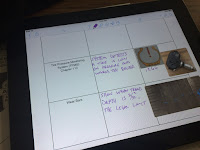But how do we know they know? (And how do they know they know for that matter?)
Formative assessment is certainly a hot educational buzzword these days.
But what is “formative assessment”? For many, formative assessment is an informal check to gauge students’ understanding and help inform decisions for future lessons. Additionally, some think it’s important to include that formative assessments are also for students to evaluate their own learning processes and help them toward the learning goals for the instructional unit. So….it’s feedback. Feedback that helps all of us determine our next steps. But what does it look like in practice?
In Ms. +Kelly Tobecksen's Spanish 1 class, there were many kinds of formative assessment for the lesson on telling time. To start the lesson, Ms. Tobecksen introduced the class to the notes with a friendly game of +Kahoot! (GetKahoot.com). While the students see it just as a fun game, they were being introduced to a new concept and at the same time, Ms. Tobecksen was able to also gather information on what the students already knew about the topic.
That night for homework, the students were assigned a flipped lesson on +EDpuzzle. Again, using this technology, Mrs. Tobecksen was able to gather data on her students’ progress. EdPuzzle is a site that allows the teacher to embed questions in videos. Ms. Tobecksen made her own videos with the +Explain Everything™ Interactive Whiteboard app, posted them to YouTube, and then imported them into EdPuzzle to add the questions as checks for understanding for the students (EdPuzzle also has a large library of videos made by other teachers). Ms. Tobecksen then received information on whether or not the students viewed the video, how much of the video they viewed, how many questions were completed, and what their score was on those questions.
 |
| Teacher view of EdPuzzle |
The next day in class, the students started by taking a 10-question multiple choice prueba formativa, formative quiz, on +Schoology. In addition to Ms. Tobecksen being able to collect information on each of the students individually, the students took the results of their formative quiz and were able to select the appropriate activities to strengthen their skills. Missed questions about number formation? Try these activities! Missed questions about forming sentences with time? Do these other activities! Did you rock that quiz? Make a short instructional video about time!
 |
| Students working on a variety of activities to suit their educational needs |
While the students were working on this wide variety of activities, Ms. Tobecksen was able to walk around and help lots of different individual students with their questions, on their activities, and pushing them to go further with their instructional videos.
 |
| Ms. Tobecksen working with individual students |
Once the students finished their activities, they were directed back to Schoology to take a cheque del objetivo, objective check, that was a 10-question fill-in quiz on the topic. This formative assessment allowed the students to see if they have made progress on the goal objective of the day (in this case, being able to tell the time in Spanish) and to help them see where they still needed to work moving forward.
By the end of the lesson on time, the students had been formatively assessed four different times on one topic. With this information, Ms. Tobecksen is able to make future decisions for the class as a whole as well as approach individual students who could use additional assistance on the topic. The students were also provided with all this same information empowering them to make decisions about how and what to continue working on.
Here are some ideas for using technology for formative assessments in your classroom:
- create a Socrative quiz to quickly check your students
- pre-teach vocabulary with a Kahoot poll (source Mr. +Joel Dufkis)
- create an exit slip in Google Forms
- have the students make a short video of themselves solving an equation (source Mrs. +Dawn Bodden)
Have you used technology for formative assessment in your classroom? Share your ideas in the comments section. Need some more support? Talk to Ms. +Dawn Bodden or one of your DTCs!


Nice post ASB!
ReplyDeleteAwesome article! Our spanish department chair just shared it with me. JWH
ReplyDelete